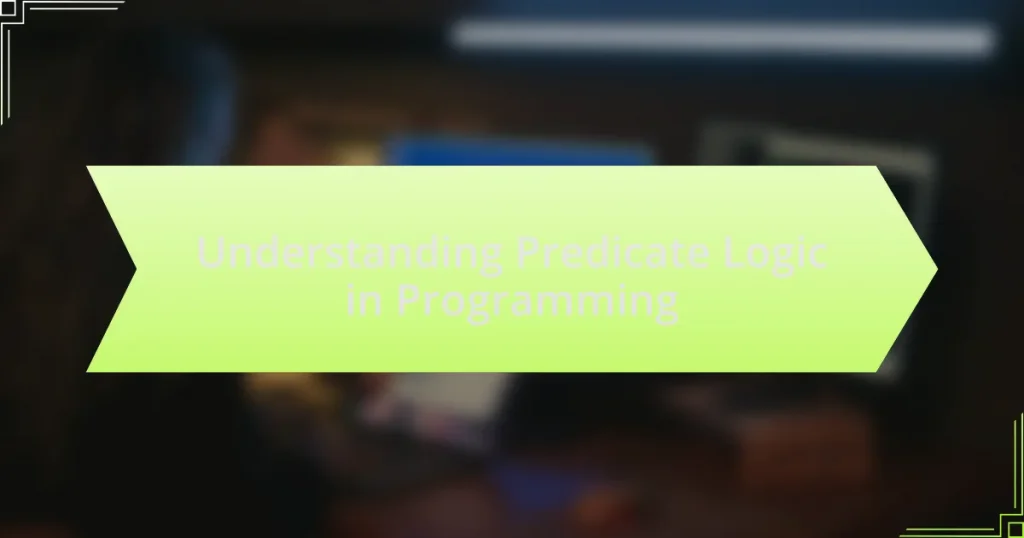The article focuses on the future of logic programming, highlighting its growth potential in artificial intelligence, natural language processing, and knowledge representation. It discusses the integration of logic programming with machine learning and other programming paradigms, emphasizing its role in enhancing problem-solving capabilities and decision-making processes. Key trends include advancements in computational power, the development of hybrid systems, and the increasing relevance of logic programming in emerging technologies such as smart contracts and automated reasoning. The article also addresses the challenges facing logic programming, including scalability and performance issues, while predicting significant innovations and the essential skills needed for future logic programmers.

What is the Future of Logic Programming?
The future of logic programming is poised for growth, particularly in areas such as artificial intelligence, natural language processing, and knowledge representation. As the demand for intelligent systems increases, logic programming languages like Prolog are being integrated into modern applications, enabling more efficient problem-solving and reasoning capabilities. The rise of machine learning and data-driven approaches complements logic programming by allowing for hybrid systems that leverage both declarative and procedural paradigms. Additionally, advancements in computational power and the development of new frameworks are enhancing the applicability of logic programming in complex domains, such as automated theorem proving and semantic web technologies. These trends indicate a promising trajectory for logic programming, as it adapts to meet the evolving needs of technology and industry.
How is logic programming defined in the context of future trends?
Logic programming is defined in the context of future trends as a paradigm that emphasizes the use of formal logic to express computation, enabling advancements in artificial intelligence, automated reasoning, and knowledge representation. This approach is increasingly relevant as industries seek to leverage complex data and enhance decision-making processes. For instance, the integration of logic programming with machine learning techniques is projected to improve the interpretability of AI systems, allowing for more transparent and reliable outcomes. Additionally, the rise of smart contracts in blockchain technology illustrates the practical application of logic programming in ensuring automated compliance and execution of agreements, showcasing its potential to shape future technological landscapes.
What are the foundational principles of logic programming?
The foundational principles of logic programming include the use of formal logic as a programming paradigm, the representation of knowledge through facts and rules, and the execution of programs via a process of logical inference. Logic programming is based on the idea that programs can be expressed in terms of relations, and computation is performed by querying these relations. This approach allows for declarative programming, where the focus is on what the program should accomplish rather than how to achieve it. The validity of these principles is supported by the success of languages like Prolog, which utilize these concepts to solve complex problems in artificial intelligence and database management.
How has logic programming evolved over the years?
Logic programming has evolved significantly since its inception in the 1970s, transitioning from foundational languages like Prolog to modern applications in artificial intelligence and data science. Initially, logic programming focused on symbolic reasoning and rule-based systems, exemplified by Prolog’s development in 1972, which introduced a declarative approach to programming. Over the years, advancements in computational power and algorithm efficiency have expanded its use in complex problem-solving, including natural language processing and knowledge representation. The integration of logic programming with other paradigms, such as functional and imperative programming, has further enhanced its capabilities, leading to hybrid systems that leverage the strengths of multiple approaches. This evolution is evidenced by the increasing adoption of logic programming in commercial applications and research, highlighting its relevance in contemporary computing environments.
Why is the future of logic programming significant?
The future of logic programming is significant because it enhances problem-solving capabilities through formal reasoning and automated inference. Logic programming languages, such as Prolog, enable developers to express complex relationships and rules succinctly, facilitating the development of intelligent systems. The increasing demand for artificial intelligence and data-driven decision-making underscores the relevance of logic programming, as it allows for efficient knowledge representation and manipulation. Furthermore, advancements in computational power and algorithms are expanding the applicability of logic programming in areas like natural language processing, automated theorem proving, and knowledge-based systems, thereby solidifying its importance in future technological developments.
What potential applications can logic programming have in emerging technologies?
Logic programming can have significant applications in emerging technologies such as artificial intelligence, natural language processing, and automated reasoning. In artificial intelligence, logic programming facilitates knowledge representation and inference, enabling systems to draw conclusions from complex data sets. For instance, Prolog, a logic programming language, is widely used in AI for tasks like expert systems and machine learning, demonstrating its effectiveness in reasoning tasks. In natural language processing, logic programming aids in parsing and understanding human languages, allowing for more sophisticated dialogue systems and chatbots. Furthermore, in automated reasoning, logic programming supports the development of systems that can automatically prove theorems or verify software correctness, enhancing reliability in critical applications. These applications underscore the relevance of logic programming in shaping future technological advancements.
How does logic programming compare to other programming paradigms?
Logic programming differs from other programming paradigms by emphasizing the use of formal logic to express computations, allowing for declarative problem-solving rather than procedural instructions. In contrast to imperative programming, where the focus is on how to perform tasks through sequences of commands, logic programming allows developers to specify what the desired outcome is, leaving the execution details to the underlying system. This paradigm is particularly effective for problems involving complex relationships and constraints, such as in artificial intelligence and database querying, where languages like Prolog excel. The effectiveness of logic programming is evidenced by its application in expert systems and automated reasoning, demonstrating its unique strengths in handling non-linear problem spaces compared to more traditional paradigms.

What are the current trends in logic programming?
Current trends in logic programming include the integration of logic programming with machine learning, the development of constraint logic programming, and the use of logic programming in web development and knowledge representation. The combination of logic programming and machine learning allows for more intelligent systems that can learn from data while maintaining logical reasoning capabilities. Constraint logic programming enhances problem-solving by allowing for the specification of constraints, which is particularly useful in optimization problems. Additionally, logic programming is increasingly being applied in web technologies, enabling more dynamic and intelligent web applications. These trends reflect a growing recognition of the versatility and power of logic programming in addressing complex computational problems.
How are advancements in artificial intelligence influencing logic programming?
Advancements in artificial intelligence are significantly enhancing logic programming by improving reasoning capabilities and enabling more efficient problem-solving. AI techniques, such as machine learning and neural networks, are being integrated into logic programming frameworks, allowing for the automatic generation of logic rules and the optimization of search algorithms. For instance, systems like Prolog can now leverage AI to handle uncertainty and incomplete information more effectively, which was a limitation in traditional logic programming. This integration is evidenced by the development of hybrid systems that combine symbolic reasoning with statistical methods, leading to more robust applications in areas like natural language processing and automated theorem proving.
What role does machine learning play in the evolution of logic programming?
Machine learning significantly enhances the evolution of logic programming by enabling systems to learn from data and improve their reasoning capabilities. This integration allows logic programming languages to incorporate probabilistic reasoning and adapt to new information, which traditional logic programming lacks. For instance, systems like Prolog can be augmented with machine learning techniques to handle uncertainty and make predictions based on learned patterns, thus expanding their applicability in real-world scenarios. Research has shown that combining machine learning with logic programming leads to more robust AI systems, as evidenced by advancements in neuro-symbolic AI, which merges neural networks with symbolic reasoning to achieve better performance in complex tasks.
How are logic programming languages adapting to modern computational needs?
Logic programming languages are adapting to modern computational needs by integrating features that enhance performance, interoperability, and usability. For instance, languages like Prolog are now incorporating support for multi-core processing and parallel execution, which addresses the demand for efficient computation in data-intensive applications. Additionally, the rise of web technologies has led to the development of logic programming frameworks that facilitate seamless integration with other programming paradigms, such as functional and object-oriented programming. This adaptability is evidenced by the emergence of libraries and tools that allow logic programming to be used in conjunction with machine learning and artificial intelligence, thereby expanding its applicability in contemporary software development.
What are the key challenges facing logic programming today?
The key challenges facing logic programming today include scalability, integration with modern programming paradigms, and performance optimization. Scalability issues arise as logic programming languages struggle to handle large datasets efficiently, limiting their applicability in big data contexts. Integration challenges occur because logic programming often operates in isolation from other programming paradigms, making it difficult to leverage the strengths of object-oriented or functional programming. Performance optimization remains a critical concern, as many logic programming systems can be slower than imperative languages, which hinders their adoption in performance-sensitive applications. These challenges highlight the need for ongoing research and development to enhance the viability of logic programming in contemporary software development.
How do scalability issues impact the adoption of logic programming?
Scalability issues significantly hinder the adoption of logic programming by limiting its ability to handle large datasets and complex applications efficiently. As logic programming relies on inference mechanisms that can become computationally expensive, performance degradation occurs when scaling up, making it less attractive for industries that require robust and scalable solutions. For instance, traditional logic programming systems may struggle with real-time processing demands in big data environments, leading to slower response times and increased resource consumption. This limitation is evidenced by studies showing that languages like Prolog face challenges in scalability compared to imperative programming languages, which are often optimized for performance in large-scale applications. Consequently, the inability to effectively scale impacts the willingness of organizations to invest in and adopt logic programming for critical applications.
What are the limitations of current logic programming languages?
Current logic programming languages face several limitations, including performance issues, lack of scalability, and difficulty in handling real-world problems. Performance can be hindered by the inherent complexity of logical inference, which may lead to slower execution times compared to imperative languages. Scalability is often a challenge, as many logic programming languages struggle to efficiently manage large datasets or complex queries. Additionally, these languages may not effectively model certain real-world scenarios, particularly those requiring mutable state or side effects, which are common in practical applications. These limitations highlight the need for advancements in logic programming to enhance its applicability and efficiency in modern computing environments.

What predictions can be made about the future of logic programming?
The future of logic programming is likely to see increased integration with machine learning and artificial intelligence, enhancing its capabilities in reasoning and problem-solving. As industries demand more sophisticated data analysis and decision-making tools, logic programming will evolve to incorporate probabilistic reasoning and uncertainty management, making it more applicable in real-world scenarios. For instance, the rise of knowledge graphs and semantic web technologies indicates a trend towards combining logic programming with these frameworks to improve data interoperability and inference. Additionally, advancements in automated reasoning tools will further streamline the development process, making logic programming more accessible to a broader range of developers and applications.
How might logic programming evolve in the next decade?
Logic programming is likely to evolve significantly in the next decade through advancements in artificial intelligence, increased integration with machine learning, and enhanced support for parallel processing. These developments will enable logic programming to handle more complex problems and improve its efficiency in reasoning tasks. For instance, the integration of logic programming with neural networks, as seen in recent research, allows for better handling of uncertainty and ambiguity in data, which is crucial for real-world applications. Additionally, the rise of quantum computing may further enhance the capabilities of logic programming by providing new paradigms for problem-solving that leverage quantum mechanics.
What innovations are expected in logic programming languages?
Innovations expected in logic programming languages include enhanced integration with machine learning, improved support for concurrent and parallel processing, and the development of more user-friendly syntax and semantics. These advancements aim to make logic programming more accessible and efficient for developers. For instance, the integration with machine learning allows logic programming to leverage data-driven approaches, enhancing its applicability in areas like natural language processing and automated reasoning. Additionally, advancements in concurrency will enable better performance in multi-core and distributed systems, addressing the growing demand for scalable solutions.
How will the integration of logic programming with other technologies shape its future?
The integration of logic programming with other technologies will enhance its applicability and efficiency across various domains. By combining logic programming with machine learning, for instance, systems can leverage logical reasoning alongside data-driven insights, leading to more robust decision-making processes. Research indicates that this synergy can improve problem-solving capabilities in complex environments, as seen in projects like IBM’s Watson, which utilizes logic-based reasoning to complement its AI functionalities. Furthermore, integrating logic programming with web technologies can facilitate the development of intelligent web applications that can reason about data and user interactions, thereby improving user experience and functionality. This trend is supported by the increasing adoption of logic programming in areas such as natural language processing and automated reasoning, which are critical for the advancement of intelligent systems.
What skills will be essential for future logic programmers?
Future logic programmers will need strong skills in artificial intelligence, particularly in machine learning and natural language processing. These areas are crucial as they enable programmers to create systems that can reason, learn, and understand human language, which are fundamental aspects of logic programming. Additionally, proficiency in functional programming languages, such as Prolog and Haskell, will be essential, as these languages are designed to handle logical expressions and facilitate the development of complex algorithms. Understanding data structures and algorithms will also be vital, as they form the backbone of efficient logic programming. The increasing demand for automation and intelligent systems in various industries further underscores the importance of these skills, as evidenced by the projected growth of the AI market, which is expected to reach $390.9 billion by 2025, according to a report by Grand View Research.
How can aspiring logic programmers prepare for upcoming trends?
Aspiring logic programmers can prepare for upcoming trends by actively engaging in continuous learning and adapting to advancements in artificial intelligence and machine learning. This preparation involves mastering programming languages such as Prolog and understanding frameworks that integrate logic programming with AI, like TensorFlow and PyTorch. According to a report by the International Journal of Computer Applications, the demand for professionals skilled in logic programming is projected to grow by 22% over the next decade, highlighting the importance of staying updated with industry trends and technologies. Additionally, participating in online courses, attending workshops, and contributing to open-source projects can enhance practical skills and networking opportunities within the field.
What resources are available for learning about the future of logic programming?
Resources for learning about the future of logic programming include academic journals, online courses, and conferences. Notable journals such as the Journal of Logic Programming and the ACM Transactions on Computational Logic publish cutting-edge research and trends in the field. Online platforms like Coursera and edX offer courses on logic programming that often include discussions on future developments. Additionally, conferences such as the International Conference on Logic Programming provide insights from leading experts and showcase emerging technologies and methodologies. These resources collectively offer a comprehensive view of the evolving landscape of logic programming.
What best practices should be followed in logic programming?
Best practices in logic programming include using clear and concise predicates, ensuring modularity, and employing efficient search strategies. Clear predicates enhance readability and maintainability, allowing for easier debugging and collaboration. Modularity promotes code reuse and simplifies testing, as smaller components can be developed and verified independently. Efficient search strategies, such as depth-first or breadth-first search, optimize performance by reducing computational overhead. These practices are supported by the success of logic programming languages like Prolog, which emphasize declarative programming and have been widely adopted in artificial intelligence applications, demonstrating their effectiveness in real-world scenarios.
How can developers effectively implement logic programming in projects?
Developers can effectively implement logic programming in projects by utilizing declarative programming languages such as Prolog or Mercury, which allow for expressing logic without detailing control flow. This approach enables developers to focus on the relationships and rules that define the problem domain, leading to clearer and more maintainable code. For instance, Prolog’s backtracking mechanism simplifies solving complex problems like puzzles or scheduling by automatically exploring possible solutions. Additionally, integrating logic programming with other paradigms, such as functional or object-oriented programming, can enhance flexibility and performance, as seen in projects that combine Prolog with Python for AI applications. This integration allows for leveraging the strengths of each paradigm, resulting in more robust solutions.
What common pitfalls should be avoided in logic programming?
Common pitfalls to avoid in logic programming include neglecting to define clear predicates, which can lead to ambiguity and confusion in logic statements. Additionally, failing to consider the efficiency of algorithms can result in performance issues, particularly with large datasets. Another significant pitfall is not properly managing recursion, which can cause stack overflow errors if not handled correctly. Lastly, overlooking the importance of testing and debugging can lead to undetected errors, undermining the reliability of the logic program. These pitfalls can hinder the effectiveness and efficiency of logic programming, making it crucial to address them proactively.



